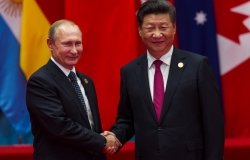Bangladesh's Foreign Policy Challenges
Hemayet Uddin, Foreign Secretary of Bangladesh. Read the transcript of the Foreign Secretary's remarks.
Overview
Click here to read the transcript of the Foreign Secretary's remarks.
At an Asia Program event on October 11, Bangladesh's highest-ranking career diplomat, Foreign Secretary Hemayet Uddin, asked a Wilson Center audience to view his country for what it was, rather than be swayed by "distortions and half truths." The people of Bangladesh, which has a population nearly half that of the United States packed into a land area the size of Wisconsin, are "committed to democracy, human rights, [and] tolerance." Despite its poverty, predominantly Muslim Bangladesh has "successfully institutionalized democracy," and has peacefully transferred power from one party to another after each of the past three elections. Bangladeshi elections have been internationally certified as free and fair, and are conducted by non-party, interim caretaker governments.
Bangladeshis are deeply religious, but have not been seduced by extremist ideologies or intolerant philosophies; allegations to the contrary are simply untrue. Freedom of religion is enshrined in the constitution. Mr. Uddin reported that Bangladesh has actively supported the war on terrorism and that cooperation with the United States in the fields of defense and law enforcement has been excellent. He also singled out money-laundering and terrorist-connected financial transfers, as well as trafficking in persons and contraband, as other areas where the United States and Bangladesh have worked well together. While noting that the expiration earlier this year of the Multifiber Agreement has created considerable difficulties for Bangladesh's formerly flourishing textile industry, he expressed the hope that legislation now threading its way through the US Congress would provide some relief.
In discussions following Mr. Uddin's prepared remarks, several audience members pointed to recent political assassinations and a spate of bombings in Bangladesh, and voiced concern that the reputation for moderation that the foreign secretary had highlighted might be slipping away. Such acts of violence, Uddin replied, happen all over the world; they are not a problem only in Bangladesh. Such actions are carried out by locally based criminals and by those who seek to discredit Bangladesh or to destroy its democracy. But such persons are not linked to al Qaeda or other international terrorist organizations, he emphasized.
The Bangladeshi ambassador in Washington, Shamsher Chowdhury, made brief remarks after those of the foreign secretary's, emphasizing the collaboration between his country and the United States in the fight against militants, and reporting that his government had been in discussions with Washington about the United States providing additional police training and equipment.
Robert M. Hathaway, Director, Asia Program, Ph: (202) 691-4020
Documents & Downloads
Hosted By

Indo-Pacific Program
The Indo-Pacific Program promotes policy debate and intellectual discussions on US interests in the Asia-Pacific as well as political, economic, security, and social issues relating to the world’s most populous and economically dynamic region. Read more
Thank you for your interest in this event. Please send any feedback or questions to our Events staff.










